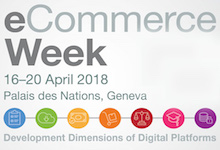4th Global survey of internet users
16 Apr 2018 10:00h - 11:30h
Event report
[Read more session reports from the UNCTAD E-Commerce Week 2018]
This session, organised by the Centre for International Governance Innovation (CIGI), Ipsos, Internet Society, and the United Nations Conference on Trade and Development (UNCTAD), focused on the extensive reliance on digital technologies and the increasing role that technology companies are gaining in political and economics fields. The results of the survey cover a number of tracking questions, providing an evaluation of trends in the wider Internet ecosystem and online economy.
The session was chaired by Mr Fen Osler Hampson (Director of Global Security & Politics, CIGI).
The first speaker, Mr Eric Jardine (Assistant Professor, Department of Political Science, Virginia Tech), provided a framework of the methodology used to run the survey and analyse the role of trust as a facilitator of e-commerce and online digital platforms. Furthermore, he touched upon the sources responsible for the expansion of trust. The survey used a sample of 25 economies, representing both developing and developed countries, which covered the greater global population of Internet users. It analysed the main concerns and issues of privacy and security. The data on the sample used for the study shows that private tech companies represent the main source that undermines trust of the Internet. It should be noted that the public sentiment when it comes to trust of social media platforms, was already low before the Cambridge Analytica case. Thus, it is clear that privacy erosion costs people to change their behaviour. However, different behaviours can be noticed: Latin American countries are more likely to avoid e-commerce applications, while in North America and the Middle East, people are most likely to engage.
The second speaker, Mr Hans Peter Dittler (President, German Chapter of the Internet Society, and Board Member, Internet Society), argued about the problem of trust, stressing that the Internet is essential for our daily lives, but for commerce as well. He stressed that trust is something that is built over time and that cannot be done by technology alone. Without trust, the Internet cannot be used and cannot be of use to any of us. Furthermore, trust can be supported by education. Going through the data of the survey, Brazil, Russia, India, China and South Africa (BRICS) are shown to have a higher percentage of trust compared to Europe and North America. It depends on environmental factors, experience, culture and many other influencing features. Moreover, questions were asked about the main concerns and threats. The most recurrent answer was that the main concerns are related to cyber criminals and social media platforms. Social media platforms are major sources of distrust, especially in North America.
However, it should be noted that e-commerce is also deemed by some as a threat. In countries such as Egypt and Brazil, e-commerce platforms add to the mistrust of the Internet. The differences in the approach could be linked to cultural and regional variables and to the different providers that are active in the area. There must be a difference in what they get offered. Finally, he stressed that the main concerns raised were about the role of private technology companies in handling private data.
The last speaker, Mr Torbjörn Fredriksson (Chief, ICT Policy Section, Division on Technology and Logistics, UNCTAD) talked about the differences in trust with regards to e-commerce. He specifically looked at data on the use of mobile technologies for payments. It showed that 60% of the users interviewed are likely to use them. However, significant differences occur: Kenya, Indonesia and China are most likely to use them, while in Japan and France less than one out of three respondents said ’yes’. Data also shows that the users of e-commerce grew by five percent from last year. Finally, on the issue of trust, he underlined the rising concerns raised in countries such as the United States, Canada and Indonesia, while the same concerns dropped in the United Kingdom and Germany.
By Stefania Pia Grottola
Related topics
Related event

